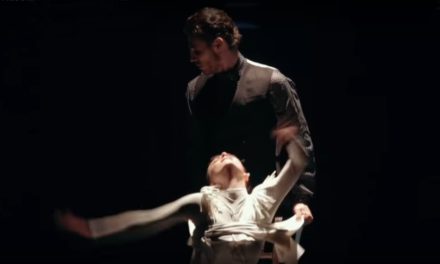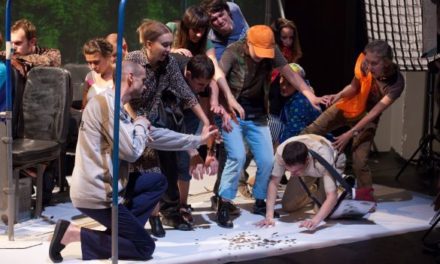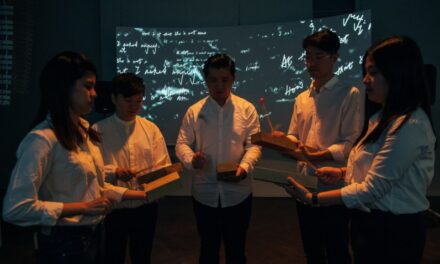The Orphan of Zhao: Seeds of Revenge was staged again recently. The premiere production was an unexpected hit, leading to subsequent successful runs in China last fall and again in Korea earlier this year. Right before it reopened in Seoul, the piece came up during the parliamentary hearings of former Minister of Culture Cho Yoon-sun. Apparently, Vice Culture Minister Park Min-kwon had asked the Minister to leave out director Ko Sun-woong from the culture and arts blacklist because he was moved deeply by the production. Public interest in Seeds of Revenge jumped after this news broke. But why are modern audiences enamoured by a revenge play written centuries ago by a Chinese playwright?
Seeds of Revenge is undoubtedly an excellent production. The performance feels sumptuous even though the stage is bare except for red curtains arranged in a half-circle. Indeed, the emptiness creates that richness; as Ko mentioned from time to time, the theatrical conventions of Yuan zaju can convey the transition from life to death with the opening and folding of a fan. Ko has updated these conventions for the modern stage. With only a few props and the actors’ movements, he creates emptiness, theatrical spaces shifting in and out like ocean waves. Ko employs the play’s sequence of cruel events as a seedbed for theatrical imagination.
Ji Junxiang’s Orphan of Zhao is the classical Chinese play most widely known in the West. It dramatizes an actual incident recorded in the House of Zhao chapter in Sima Qian’s history Shǐjì. According to the historical document, the evil Tu’an Gu falsely accused the virtuous Zhao Dun of being a traitor to the kingdom and slaughtered three hundred of the Zhao clan. Ji’s drama begins after Tu’an Gu’s carnage, when his sword is already pointed at the last orphan of the Zhao bloodline. The play then follows Tu’an Gu’s relentless attempts to kill the orphan and the orphan’s desperate struggle to survive. The Orphan of Zhao is a tightly-knit chase drama and revenge play. Cheng Ying walks through this story of vengeance, clutching the orphaned child to his chest. Cheng Ying has no stake in the power struggle. He is not even a member of the Zhao family. He is a simple country doctor who was staying at Zhao Dun’s house. As Tu’an Gu closes in on the orphan, many people sacrifice their lives to save the child. Among those that die to save the orphan is Cheng Ying’s own baby.
As is typical for classical drama, the world of The Orphan of Zhao is clearly bifurcated into good and evil, justice and injustice. The play does not ponder on why Tu’an Gu commits such savagery, why it is just to protect the orphan of Zhao, or why so many people must throw away their lives to avenge the wronged. In the world of classical drama where authority and justice are intertwined, there is never any doubt that revenge is the only way to vanquish evil and restore justice. In that sense, Cheng Ying is an enigmatic character. Cheng Ying is entirely removed from this world of power. Yet he traverses through the revenge drama. He even gives up his own child.
The Orphan of Zhao: Seeds of Revenge largely follows Ji Junxiang’s drama. Other modern adaptations might try to rationalize why Tu’an Gu frames Zhao Dun or why Cheng Ying willingly enters the realm of vengeance. However, Ko’s adaptation preserves the absolute moral universe of the original work. Seeds of Revenge reconstructs characters omitted from the original play, the many individuals who are forced to live in this turbulent world of power struggles. Ko adds minor characters, such as the assassin hired by Tu’an Gu who sneaks into Zhao Dun’s home but dies for no good reason and the gatekeepers who banter in front of the palace gates as Cheng Ying and Han Jue wrestle with matter of life and death. Of course, the assassin’s death or the gatekeepers’ inconsequential dialogue cannot sway the direction of the plot. The same is true for Cheng Ying’s wife. This character—Ko’s own invention—stops Cheng Ying and asks why their child must die to save the orphan of Zhao. However, not even she can stop the revenge play from following its set course. Instead, Seeds of Revenge takes figures absent in the classical drama and places their lives in the foreground of the main conflict between good and evil.
“Like Reading a Wuxia novel”
Kim Soyeon: Ko Sun-woong adapted and directed Seeds of Revenge based on Ji Junxiang’s Orphan of Zhao. Both versions are revenge plays but they diverge in significant ways. Their endings—the achievement of vengeance—are also different. As a reader of the script and the actor playing Cheng Ying, how did you respond to the two versions?
Ha Sung-kwang: When the National Theatre Company of Korea cast me for The Orphan of Zhao, they told me that I would play the orphan’s foster father. I assumed the orphan was the main character and I would play the title role’s father—like Hamlet and Hamlet’s father. But once I read the play, I realized that Cheng Ying was a much larger role. Cheng Ying has a larger part in Ko’s adaptation. Also, the play reminded me of reading a Wuxia novel. It felt like an old Chinese legend.
Kim: In both the original play and the adaptation, Cheng Ying is the main character.
Ha: There are more characters in the adaptation that don’t appear in the original. I think that Cheng Ying became more important because of the diversity in characters. Each scene seems isolated from others, but everything is connected.
Kim: Generally speaking, the world of classical drama—especially tragedy—focuses on noble characters such as kings and lords. The center of the violent conflict in this play, however, is a country doctor. Comparing the production to the original text, I was amazed at how exquisitely the adaptation repositioned Cheng Ying to the center of the play. I think the production offers a more detailed portrait of the character.
Ha: Our audiences have been very supportive. I’m very grateful. Korea was in political turmoil during both the 2015 premiere and the recent run. The play features heroic characters such as Tu’an Gu, Zhao Dun, Han Jue, and Gongsun Chujiu, but I think it’s actually about the masses. I think the audience recognized that. People made the connection between the story and their own pain and struggle. I think that’s why they responded to it well.
Kim: Also, it’s a lavish production. It has the epic scale of classical drama. The concepts of justice and revenge in this play are different from the worldview of modern plays. Also, Ko’s modern style as a director is superimposed onto an old play. I think people find the multiple layers interesting. But I don’t think an actor would approach the production like that.
Ha: It’s too complicated to distinguish among different layers. The whole thing could fall apart.
Kim: I agree. The audience’s perspective is different from the artist’s. What was your initial response to the character?
Ha: I felt that Cheng Ying’s struggles reflected the lives of people today. I also liked that it was the story of a common man like me. You mentioned Ko’s style as a director. Before rehearsals began, I told myself that I would do whatever he asked for. When I performed in his 2010 play Mermaid City, he let me do whatever I wanted to try. This time, I decided to concentrate on how he wanted to craft the performance. I think a lot of what I have to offer came through in the process.
Kim: What do you mean by what you have to offer?
Ha: Hidden aspects of myself surfaced while I worked on this play and this character. I understood Ko’s style and his approach to storytelling. That understanding allowed me to be free. I liked what I was feeling so I expanded on that. We created the performance bit by bit like that. Once the form is set, you have to be able to play around within that form. There is freedom in form. I put everything I’ve got into it.
Kim: You said you felt free. As an actor, isn’t it difficult to work with a director with a strong personal style like Ko?
Ha: You have to be able to get inside that style.
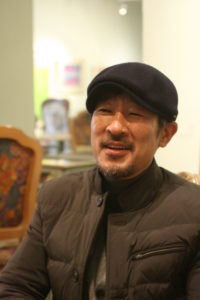
Ha Sung-kwang. Photo: Choi Yoon-woo
“Not too light, not too heavy”
Kim: Get inside that style. That sound simple enough but the process probably wasn’t easy. I noticed that Seeds of Revenge was both a continuation and a change for Ko as a director. In Ko’s work, there are these sudden interruptions: incongruous lines, situations, and actions that take the drama of track. Audiences love these moments. Now they’re integral to what people recognize as Ko’s style. On the other hand, these sudden interruptions don’t always merge with the rest of the performance. I wish they went further, but they often generate surprised laughter and nothing more. Seeds of Revenge also has moments like this.
Ha: Yes, they come out of the blue.
Kim: Yes, there are characters and conversations that come out of the blue. When Cheng Ying nervously stands before the palace gates with the orphan hidden in a basket, wondering if he’ll be able to make it through safely, we hear banter between two gatekeepers. Then, in Act 2 when the orphan has grown up, there is a brief scene that connects back to this dialogue. Of course, the scene in Act 2 comes out of nowhere, too.
Ha: That’s what makes his work great. If you’re too light, the drama loses momentum. If you’re too serious, the play becomes heavy. His style comes out of the balance between the two.
Kim: The same goes for the character Cheng Ying. A lot of the promotional material for the production depicts the last scene of Act 1 where Cheng Ying clutches onto the orphan after his own son dies in his place. I think it’s because that moment captures the stakes and tragedy of Cheng Ying’s turmoil. Your performance, and the play as a whole, left a deep impression on me.
Ha: It was a great process. The ensemble worked well together. There are many seasoned actors in the cast so everyone pulls their own weight. Teamwork was especially important for this process. You mentioned the unexpected characters and lines. These elements may seem out of place in the main plot, but they are not separate. Regarding the gatekeepers, if that scene was played entirely for laughs, the following scene with Cheng Ying and Han Jue can end up feeling too light as well.
Kim: In this play, the scenes don’t adhere a cause-and-effect structure. There are a lot of incongruous elements. But the scenes are not separate from one another either. The same can be said about the characters. An actor must embody a theatrical style while presenting a coherent character. How did you manage to achieve that?
Ha: During rehearsals, I tried to learn my lines as quickly as possible. I have a lot of lines and I’m in a lot of scenes. Most of the other characters meet Cheng Ying in a single scene, but Cheng Ying has to meet all of these people. I had to have these scenes ready for rehearsal every day. I had to adjust my work and gradually build up a character while meeting these various people in each of the scenes. I didn’t have a goal I was striving towards for each scene. Instead, as is often the case in theatre, I had to adjust and discover my character through the various situations and encounters.
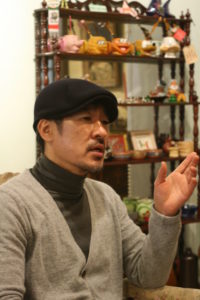
Ha Sung-kwang. Photo: Choi Yoon-woo
“I wanted to remember and tell the stories of those who suffer”
Kim: I think I can see that process in the performance. Ko uses unexpected elements effectively in all of his work, but it was especially striking to see the characters respond to events around them in surprising ways. But there must have been things that you, the actor playing Cheng Ying, had to work out alone. What was the most difficult scene for you?
Ha: None of the scenes were easy. If I had to pick just one, it would be a scene in the second act. Cheng Ying tells a story that is unbelievable to the orphan, but is a repetition of events that the audience already saw in Act 1. I thought a lot about how to make audiences pay attention to a story that they already knew without making it tedious.
Kim: What motivates Cheng Ying to recount the past? The primary purpose is to tell the orphan what happened long ago, but your performance didn’t seem to be only about providing exposition.
Ha: Cheng Ying tells the orphan what happened in the past. And he persuades him to take revenge. Sometimes the play seems to be a story of good triumphing over evil, and sometimes it seems to be about oppressors and the oppressed, or aggressors and victims. The characters talk about things like loyalty and duty. But is this a play about justice? If you say yes, then the play becomes too simplistic. As we’re talking, I’m reminded of a line in the preface of Kim Hoon’s novel Namhansansung. [Translator’s note: A popular history novel about a decisive battle during the Second Manchu invasion of Joseon in 1636.] “Whose side are you on?” “I am not on anyone’s side. I am on the side of those who suffer.” I love that line. A lot of people are suffering in our society today. Of course, Cheng Ying’s suffering is fictional and can’t be compared to what actual people go through. Still, I reflected on that idea a lot. The adaptation is called Seeds of Revenge and it’s a revenge play, but I don’t feel that this is a story about truth and falsity, or right and wrong. I wanted to remember and tell the stories of those who suffer. That’s what Cheng Ying tries to do, and that’s what I tried to do as the actor playing him.
Kim: This is a production based on a classical Chinese play with a rich style, but people seem less engaged with theatrical signs or artistic merit and more with how the performance affected them emotionally.
Ha: The audience gets where the characters are coming from. We are all someone’s child and many of us are a parent to someone. It’s not hard to understand the situation that these characters are in. Pity is something that comes naturally to us humans before we are even given an explanation. It may be difficult for us to see ourselves in Cheng Ying’s dire situation, but it isn’t difficult to understand.
Kim: Cheng Ying’s pain isn’t just about the loss of his child. It’s about his choice to accept an immense task. Cheng Ying could have refused to take the orphan. He could have given the orphan to Tu’an Gu. But he didn’t.
Ha: I don’t know if you can call it Cheng Ying’s choice. I think that decision was thrust upon him. That doesn’t mean he didn’t have a say in the matter. In that sense, it was his choice. But I don’t think it was a choice between right and wrong. It’s not something that a normal person can decide on their own.
Kim: According to Chow Jian Sen’s review, revenge cannot be completed unless everyone accepts their part of task. Revenge is not completed by Cheng Ying alone, but rests on everyone. I could see that in this production.
Ha: You can’t achieve greatness by yourself.
Ha Sung-kwang grew up in Jindo, South Jeolla province. He has worked with Theatre Company 76, Hanyang Repertory, Theatre Company Moochun, and Theatre Company Jookjook. He has appeared in many productions, including Generations, Offending the Audience, The Trap: Meditations on Hamlet, King Lear, Mermaid City, Poongchan Nosook, The Joke, Remote Backwater Island, and The Orphan of Zhao: Seeds of Revenge. He won the Seoul Theatre Festival New Actor Award (2006) and the Donga Award in Acting (2015).
Kim Soyeon is a theatre critic and former editor of Culture News and weekly@arts management. She writes about theatre and produces magazines with an interest in how the stage can communicate with the world.
Translated and edited by Kee-Yoon Nahm
This article was originally published in Korean Theatre Journal, the official journal of the International Association of Theatre Critics – Korea. Reposted with permission.
This post was written by the author in their personal capacity.The opinions expressed in this article are the author’s own and do not reflect the view of The Theatre Times, their staff or collaborators.
This post was written by Kim Soyeon.
The views expressed here belong to the author and do not necessarily reflect our views and opinions.


